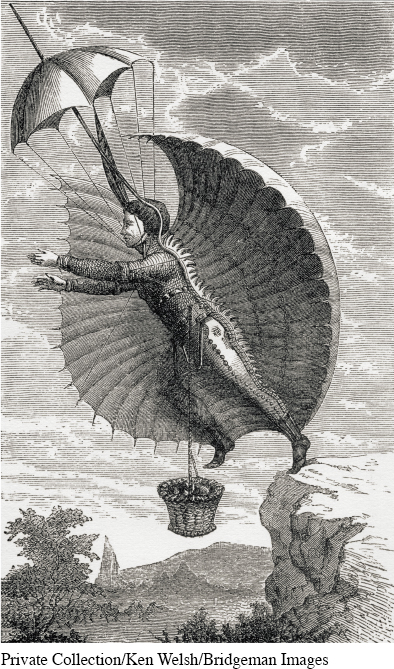Flight 063
Flight 063
Brian Aldiss

Brian Aldiss (b. 1925) is a lecturer, a critic, a poet, and an essayist who is also well known for his science fiction novels, which gained him entry into the Science Fiction Hall of Fame in 2004. His short story “Super Toys Last All Summer Long” was the basis for the Steven Spielberg film A.I. Artificial Intelligence. In this poem, which is not a work of science fiction, the speaker contemplates while flying in a large Boeing plane how flight, once considered impossible, is now commonplace.


This 1870 engraving is from the book Wonderful Balloon Ascents or the Conquest of the Skies, created eighty-
Why always speak of Icarus’ fall? —
That legendary plunge
Amid a shower of tallow
And feathers and the poor lad’s
5 Sweat? And that little splash
Which caught the eye of Brueghel
While the sun remained
Aloof within its private zone?
That fall remains
10 Suspended in the corporate mind.
Yet as our Boeing flies
High above the Arctic Circle
Into the sun’s eye, think —
Before the fall the flight was.
15 (So with Adam — just before
The Edenic Fall, he had
That first taste of Eve.)
Dinner is served aboard Flight 063.
We eat from plastic trays, oblivious
20 To the stratosphere.
But Icarus — his cliff-
The leap of heart, the blue air scaled —His glorious sense of life
Imperiled. Time
25 Fell far below, the everyday
Was lost in his ascent.
Up, up, he sailed, unheeding
Such silly limitations as
The melting point of wax.
Understanding and Interpreting
The speaker puts the story of Icarus’s fall into a modern context—
flying in a passenger jet “High above the Arctic Circle / Into the sun’s eye” (ll. 12– 13). Thus, he or she places all of the passengers in the plane in a situation similar to that of Icarus, who flew close to the sun as well. How does this juxtaposition between the ancient Icarus and modern passengers on a commercial flight contribute to the overall meaning of the poem? How do the “oblivious” passengers (l. 19) on the plane support the speaker’s main assertions about the significance of Icarus’s flight?
The speaker claims that Icarus had a “glorious sense of life” (l. 23). In what ways is that attitude toward Icarus reflected in the ideas offered within the poem as a whole?
Analyzing Language, Style, and Structure
The speaker begins with a rhetorical question. What is the purpose of directing our attention to an aspect of the myth that is often ignored?
How does the inverted syntax in lines 11–
14 refocus the emphasis concerning the outcome of Icarus’s flight? The poem ends with Icarus still ascending. How does this choice reinforce the rhetorical question in line 1?
How do the connotations of the word “silly” (l. 28) contribute to the speaker’s attitude toward Icarus’s fall?
Connecting, Arguing, and Extending
The speaker in the poem uses Icarus’s failed flight to comment on our current response to flying in an airplane. Once considered nothing but a fantasy, flying is now a common occurrence — in the United States alone, an average of 1.8 million people fly every day, according to the Transportation Security Administration. The ability to fly has not only provided people with a chance to go places they would otherwise never visit but changed the course of history. What technology do you use regularly that once was considered impossible? In what significant ways has this technology changed the world?
The poem raises the idea that terrible consequences sometimes befall individuals who push the limits of technology. For example, even though Icarus did fly, he paid for that flight with his life. Pilots also risk their lives when testing new airplanes and many have perished during test flights. However, it is also true that technological failures provide an opportunity for people to figure out what went wrong and correct the problems. Those who fail can ultimately inspire others to try even harder to achieve what previously was deemed impossible. What do you think drives individuals to risk their lives attempting to push the limits of technology?
A quick search for “extreme sports” on YouTube will call up thousands of videos of people taking incredible risks and filming their attempts. Some of the videos show people taking incredible risks and succeeding, while many others catalog spectacular failures. These risk takers are not generally trying to advance technology in any way but seem to be interested simply in the thrill of the attempt. Explain what you believe to be the motivation for this risk taking and argue whether it serves a larger purpose or is just an interesting distraction.